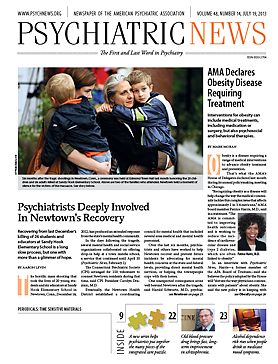Obesity is a disease requiring a range of medical interventions to advance obesity treatment and prevention.
That’s what the AMA’s House of Delegates declared last month during its annual policymaking meeting in Chicago.
“Recognizing obesity as a disease will help change the way the medical community tackles this complex issue that affects approximately 1 in 3 Americans,” AMA board member Patrice Harris, M.D., said in a statement. “The AMA is committed to improving health outcomes and is working to reduce the incidence of cardiovascular disease and type 2 diabetes, which are often linked to obesity.”
In an interview with Psychiatric News, Harris—a former member of the APA Board of Trustees—said she believes the policy adopted by the House will “elevate the way physicians communicate with patients” about obesity. She said the new policy is in keeping with AMA’s commitment to improve health outcomes, which is one of the organization’s long-term strategic objectives.
Harris added that treatment of obesity should encompass a variety of interventions depending on the needs of the individual patient—medical treatments, including surgery or medication, but also psychosocial and behavioral interventions. She added also that obesity has been viewed by some as a lack of willpower with regard to eating, a stigma that should be dispelled by the understanding of obesity as a disease.
But opinion in the House of Delegates was far from unanimous. A report from the AMA’s Council on Science and Public Health (CSPH) examined in depth the public health implications of obesity and explored the potential benefits—but also the scientific challenges—of defining obesity as a disease.
“Without a single, clear, authoritative, and widely accepted definition of disease, it is difficult to determine conclusively whether or not obesity is a medical disease state,” the CSPH report states. “Similarly, a sensitive and clinically practical diagnostic indicator of obesity remains elusive. Obesity, measured by BMI, is clearly associated with a number of adverse health outcomes, with greater consistency across populations at the highest BMI levels. However, given the existing limitations of BMI to diagnose obesity in clinical practice, it is unclear that recognizing obesity as a disease, as opposed to a “condition” or “disorder,” will result in improved health outcomes. The disease label is likely to improve health outcomes for some individuals, but may worsen outcomes for others.”
Robert Gilchick, M.D., a public health physician and member of the CSPH who spoke for the council, argued against the definition. “We recognize obesity as a serious health condition with increased risk for disease, but the difficulty in screening and measurement and the lack of a precise definition [of disease] are all problematic,” he said. “We feel further that medicalizing obesity with a focus on pharmacologic and surgical interventions may reduce the focus on primary prevention efforts addressing underlying and upstream social determinants of obesity.”
The CSPH report called only for reaffirmation of existing AMA policy regarding management of obesity. However, a separate resolution introduced by the American Association of Clinical Endocrinologists and six other physician groups urged that the AMA “recognize obesity as a disease state with multiple pathophysiological aspects requiring a range of interventions to advance obesity treatment and prevention.”
The resolution was supported by a wide range of physician groups and was approved by the House of Delegates.
“Obesity has unfortunately been considered a consequence of lifestyle choices, but we now have an abundance of evidence identifying obesity as a multi-metabolic and hormonal disease,” said John Seibel, M.D., of the American Association of Clinical Endocrinologists. “Obesity is a pathophysiologic process involving characteristic signs and symptoms and morbidity. Hormonal and metabolic abnormalities are heterogenous in nature and are likely to require multiple risk-stratified interventions including but not limited to lifestyle interventions.” ■

